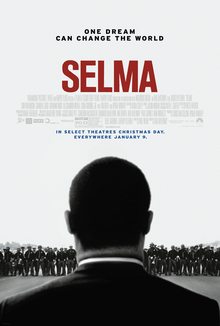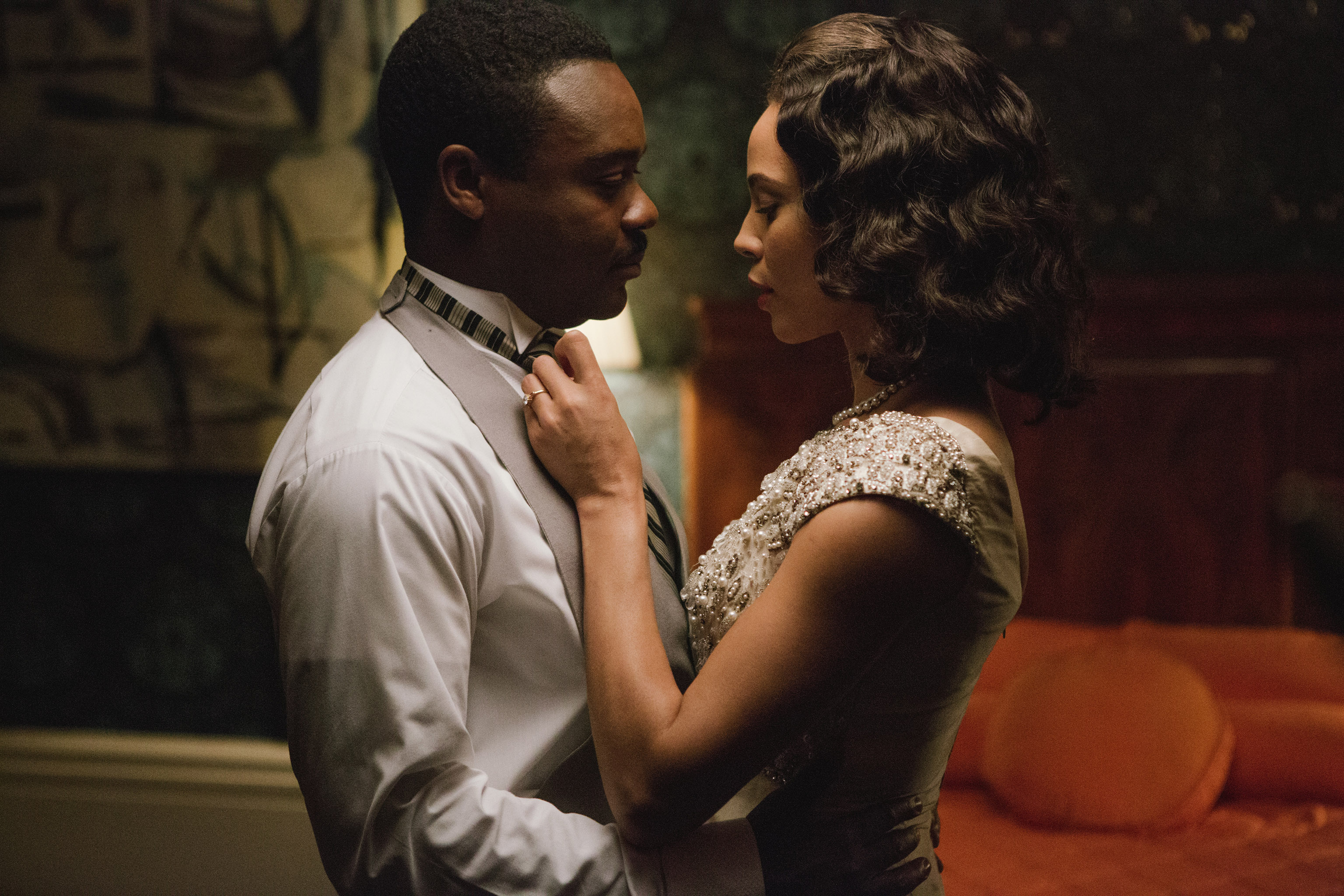SELMA
Part of me looks upon Selma with a jaundiced eye, thinking that this is Oprah Winfrey's naked play at getting a competitive Oscar for producing. She already has a Jean Hersholt Humanitarian Award because frankly that's the only Oscar the Academy could possibly give her without it causing laughter throughout the world. You can't seriously expect Winfrey to get a Lifetime Achievement Oscar for what, five live-action features (counting Selma, where Lady O had to thrust herself into history). OK, it's out: I am not an Oprah fan. I think she has made this nation, through her eponymous chat-show, a nation of crying narcissists who have an entitlement complex (though her cleaning tips on the magazine that bears her name and which features her photo on every cover are good...such a shrinking violet our Winfrey is). Fortunately, Oprah is not a large part of Selma, a film that focuses on the actual story rather on showing how 'important' everyone's actions and thoughts were.
Dr. Martin Luther King, Jr. (David Oyelowo) has already won the Nobel Peace Prize, but he knows that the real prize, full equality for all citizens black and white, is still being denied. He goes to President Lyndon Johnson (Tom Wilkinson) to get him to push for a Voting Rights Act, but Johnson believes the "Negro" (as African-Americans were called back then) will have to wait. Dr. King believes they should not wait, and so it's off to Selma, Alabama, one of the toughest nuts to crack in terms of voter registration for black citizens. Dr. King soon starts organizing, and there is a terrible cost for all involved. People are killed, and Dr. King's private life is exposed to Coretta Scott King (Carmen Ejogo). Alabama Governor George Wallace (Tim Roth) is determined to keep Alabama's black citizens disenfranchised. Dr. King is determined to get the vote, and the best way is to do three things.
"We negotiate. We demonstrate. We resist".
That means going on a march from Selma to the state capital of Montgomery. The first effort ends with the police stampeding against the marchers across the Edmund Pettus Bridge. Dr. King was not there due to his efforts to save his relationship with Mrs. King. The violent reaction has a positive effect in motivating the nation, particularly white clergy of all faiths, to join the protests. When King decides not to cross the bridge the first time, it inadvertently leads to the death of a white minister, James Reeb (Jeremy Strong). The push becomes too strong to resist, and Johnson now pushes for the Voting Rights Act and Dr. King and his supporters end at the Montgomery Capital building steps.
What really makes Selma more than a simple recitation of facts is director Ava DuVernay's to keep things on a ground level so to speak. She has the actors play scenes as if it were real life, and they were unaware of how 'monumental' each moment was. There are moments when these historic figures like King, or Andrew Young (Andre Holland) or Ralph Abernathy (Colman Domingo) are around a kitchen table, laughing and enjoying good food. They also argue among themselves as to what should be done, with King listening as weighing the decisions. Selma is not afraid to show the characters as human, complete with all their flaws and failings.
Of particular note is when Coretta Scott King listens to a recording of both threats to her husband and evidence of his unfaithfulness with other women. Divorced (no pun intended) from the historic aspects, this scene could come from any domestic drama. Where both DuVernay's directing and the performances of Oyelowo and Ejogo (both of whom are British, mind you) go right is that none of it is overplayed or held for great dramatic effect. In fact, the entire scene is quite controlled, which makes for a more powerful sequence. When Coretta asks Martin if he loves her, then asks if he's loved any of the others, there is a long and painful pause with the latter question. We can see the conflict within Dr. King, between a tacit admission of rampant infidelity and a recognition that as a leader, he has done great things, but as a husband, he has failed.
What Selma has is simply two of the strongest performances of the year with Oyelowo and Ejogo. The Martin and Coretta Scott King in the film are not just this mythic, remote figures, but real humans, with all the failings and virtues that come with it. In Selma, we see that they are the people they portray. It goes beyond mere mimicry. It would have been easy for Oyelowo to just copy King's more familiar speaking cadences and rhythms, but instead Oyelowo goes for portraying someone who can laugh and mourn for a grandfather who loses his grandson when the latter is shot by the police but still offers great respect for the leader of the movement. It helps tremendously that Oyelowo is made to look like Dr. King, but that is just part of what makes his performance so great. It helps tremendously that Oyelowo does capture King's speaking manner, but that also is just part of what makes his performance great.
What really pushes Oyelowo is that he makes Dr. King someone who doubts, who fears, who finds solace in calling gospel legend Mahalia Jackson in the middle of the night to request his favorite hymn, Take My Hand, Precious Lord. The King here is not some remote and lofty figure, but a real person.
Allow me a slight digression to compare Oyelowo's work on Selma with a more touted and praised performance: Eddie Redmayne as Stephen Hawking in The Theory of Everything. Redmayne was efficient in his "I want an Oscar" performance: technically capable but essentially soulless, getting the physical aspects but never the core of who Hawking is. His fellow Brit Oyelowo on the other hand got both the physical aspects but also the emotional core of Dr. King (and he had to do it with a convincing American accent to boot). Redmayne was again efficient, but Oyelowo was effective. Pity that Redmayne is being held as some turning point in acting while a much better and stronger performance is being relegated to almost an also-ran when Oyelowo brought a real performance to Redmayne's cold, studied, and mechanical one.
End of Editorial.
Ejogo similarly matches Oyelowo, for she not only looks like Coretta Scott King (and sounds like her, again impressive for a non-American) but also gives us a full range of emotion: the supportive wife, the put-upon injured party to her husband's infidelities, and an intelligent and resourceful woman on her own right.
About the only performances I found slightly exaggerated/comical were two other British thespians. It is hard for Wilkinson to be believable as Johnson, neither looking or sounding like the brash but wily Texan he was, and Roth as George Wallace similarly came off as a bit cartoonish.
Those, however, are minor points. DuVernay brings out not just great performances from almost her whole cast, but has some simply astonishingly beautiful moments, even when showing real-life horrors. For example, while we should know that the bombing of the 16th Street Baptist Church in Birmingham (which killed four little girls) is coming, the explosion itself is still quite shocking. The slow-motion of seeing pretty dresses floating about is both beautiful and chilling, making the impact of seeing the dead children all the more painful. Equally brutal but visually arresting is the police attack on the marchers on the Edmunds Pettus Bridge. DuVernay does not shy away from showing it as the brutal assault it was, but with the mixing of period-appropriate music and again a slow-motion visual motif, we are treated to almost a freeze-frame of horror with men and women being attacked on all sides.
The cross-cutting between the protestors, the white Southerners opposed to them, and the Student Non-Violent Coordinating Committee (or SNIC for short) is also well-done.
I wouldn't go so far as to say Selma is 'an important film'. I will say that Selma is a well-acted, well-directed, well-crafted film, one that gives us both the historic and the personal of the figures we see. It is as good a film about not just the past but the present, with all the troubles from Ferguson (which is reference in the song Glory that closes the film, although on a personal note I believe Selma and Ferguson are not equivalent in any way and to suggest as much is a disservice to both). If we judge a film by the work in front of the camera, Selma is an extraordinary success. If we judge a film by Paul Webb's screenplay (the historical accuracy notwithstanding), Selma is an extraordinary success.
Today, January 15, if he had lived, Dr. Martin Luther King, Jr. would have been 86 years old. Selma could not have come at a more opportune time. On another personal note, this Selma review marks my 1,300 published post, and I'm proud that that small footnote too is for such a fine production.
Emotionally moving, with a top-notch cast and crew, Selma is simply put, a most excellent film.
 |
| Martin Luther King, Jr.: 1929-1968 Coretta Scott King: 1927-2006 |
DECISION: A-



No comments:
Post a Comment
Views are always welcome, but I would ask that no vulgarity be used. Any posts that contain foul language or are bigoted in any way will not be posted.
Thank you.